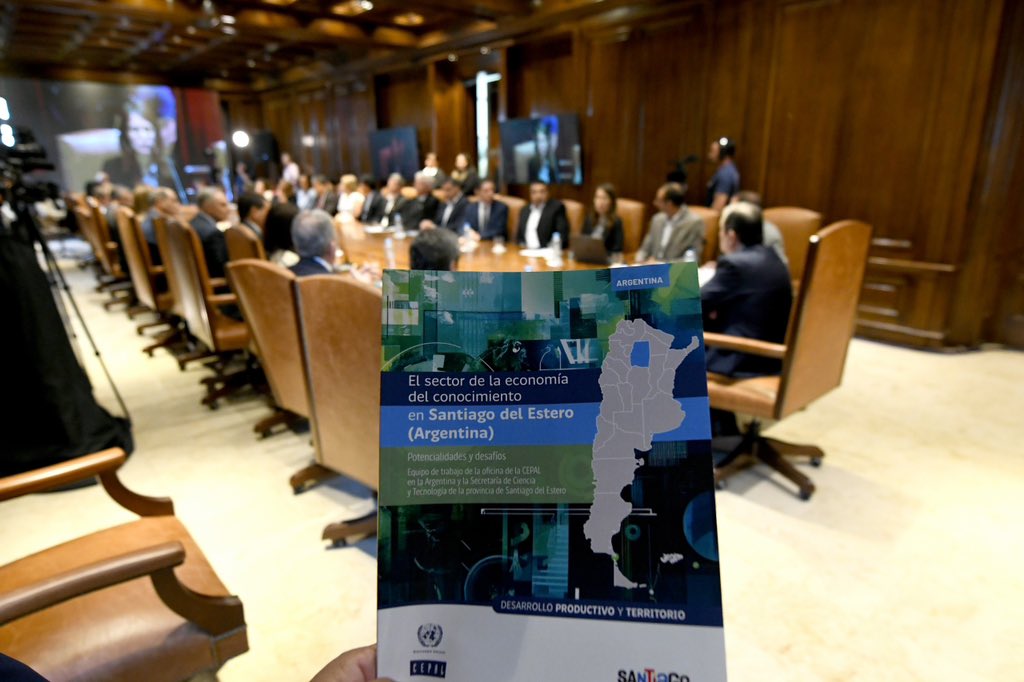ECLAC Supports Strengthening Argentine Provinces’ Capacities in New Areas
In conjunction with authorities and experts from government, academia, the private sector and civil society in the provinces of Santiago del Estero, Tucumán and Entre Ríos, the United Nations organization’s national office made headway on three technical studies that allow for expanding policy design and analysis capabilities on issues of relevance: the knowledge economy, productive development, and gender.

In response to the interest expressed by the government of Santiago del Estero, ECLAC’s national office in Argentina carried out technical assistance jointly with the province’s Secretariat of Science and Technology in order to make an assessment of the knowledge economy ecosystem in the province and to continue promoting that sector’s development.
The study included the mapping of stakeholders through on-the-ground fieldwork, which involved interviews with representatives of the private sector, the science and technology system, and provincial authorities. This analysis enabled the evaluation of existing capacities and articulation between various actors in the framework of the policies being led by the provincial government.
The outcome revealed a latticework that, while smaller in volume than in bigger provinces such as Buenos Aires or Santa Fe, is notable for its high density of ties and its large potential for growth. The presence of universities and technical schools that have trained engineers and programmers for decades – coupled with strong coordination between public organizations, private associations, and academic and research environments – constitute a solid foundation for the sector’s development.
According to the study, the province’s public sector also plays a crucial role by supporting diverse entities and programs, in the framework of a provincial law on the knowledge economy. The analysis identifies growth opportunities and stresses the importance of strengthening the institutional links between the public sector, the private sector, and science and technology organizations. The strategies proposed include improving demand articulation, continuing to promote partnerships among actors, and increasing local businesses’ competitiveness.
The Economic Commission for Latin America and the Caribbean (ECLAC) presented the results at a seminar that featured the presence of Governor Gerardo Zamora, some of his cabinet ministers, the secretary of science and technology, and all the relevant stakeholders from the ecosystem. These findings were detailed in a recent publication entitled The Knowledge Economy Sector in Santiago del Estero (Argentina): Potential and Challenges (in Spanish only) and will be incorporated as a contribution to the province’s Strategic Plan on Science, Innovation and Technology, thereby strengthening the foundations for sustainable and high-quality development.
Gender Equality Observatory in Tucumán’s Productive Sector
ECLAC, in response to a request by the Productive Development Institute (IDEP) of Tucumán, supported the development of the Gender Equality and Employment Observatory (OIGE), an unprecedented initiative in the province.
This Observatory aims to address gender gaps in the productive sector through a comprehensive analysis that takes economic, physical and political factors into account. Its inspiration derives from ECLAC’s definition of autonomy: people’s ability to make free and informed decisions about their lives in an environment that makes that possible.
In October 2024, the OIGE was unveiled at an event coordinated by the IDEP that drew the attendance of local businesspeople along with specialists from ECLAC in Argentina.
One of the Observatory’s most important tasks will be to implement a pioneering survey among businesses in Tucumán. This tool will allow for compiling disaggregated data on gender inequalities at a sectoral and territorial level. In addition, it will identify the business strategies in place for ensuring gender equity, setting a precedent at a national level.
In addition, a preliminary analysis of gender gaps in the province was presented, stressing both the challenges and opportunities that were identified. These inputs are critical for designing policies that would promote equity in the labor market and the productive sector.
These studies are conducted in the framework of the technical collaboration work carried out by ECLAC in Argentina along with subnational governments. Another such endeavor is the recent estimation of the Input-Output Matrix for the province of Entre Ríos, which is of interest for evaluating policies and better understanding the province’s productive fabric.
Related content
Subregional headquarter(s) and office(s)
Type
Country(ies)
-
Argentina
Related link(s)
-
La CEPAL presentó en Casa de Gobierno el documento de caracterización de Economía del Conocimiento 2024 (Santiago del Estero)
Lanzamiento del Observatorio de las brechas de género en los sectores productivos de Tucumán (LinkedIn)
Lanzamiento del Observatorio de las brechas de género en los sectores productivos de Tucumán (Instagram)
Lanzamiento del Observatorio de las brechas de género en los sectores productivos de Tucumán (Facebook)
Informe de CEPAL: “Entre Ríos es poco proveedora de sus propios productos” (news piece published in Análisis)
Contact
Oficina de la CEPAL en Buenos Aires
- cepalbue@cepal.org
- (54 11) 5436 4000